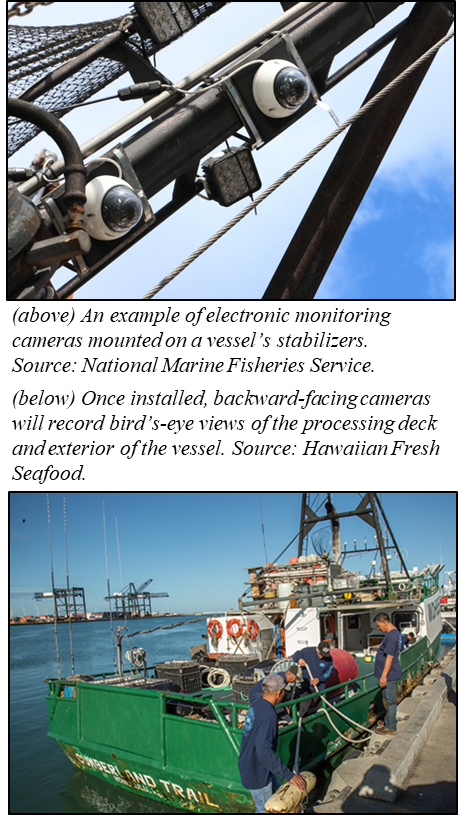News and Announcements
Press Release – Scientists Highlight Critical Discussions on Observer Coverage, Fishery Management & Future Planning (14 June 2024)
 HONOLULU (14 June 2024) The Scientific and Statistical Committee (SSC) of the Western Pacific Regional Fishery Management Council concluded its meeting yesterday, spotlighting negative impacts of reduced observer coverage in the Hawai‘i longline fisheries and engaging in strategic discussions on improving fishery management in the region.
HONOLULU (14 June 2024) The Scientific and Statistical Committee (SSC) of the Western Pacific Regional Fishery Management Council concluded its meeting yesterday, spotlighting negative impacts of reduced observer coverage in the Hawai‘i longline fisheries and engaging in strategic discussions on improving fishery management in the region.
A primary discussion centered on the necessity of robust observer coverage for effective monitoring and management of longline fisheries. The SSC emphasized the critical role observers have in evaluating existing management measures, such as the swordfish shallow-set longline trip interaction limits for sea turtles. Enhancing observer coverage is vital for improving the precision of interaction estimates with species rarely encountered, ensuring the accuracy of data that influences management decisions for protected species like the insular false killer whale.
The SSC heard a report from the Electronic Technologies Steering Committee on electronic monitoring, a system being used in other U.S. and international fisheries to complement human observer coverage. The SSC recommended its members work with Council advisors on integrating electronic monitoring systems through robust sampling strategies. This initiative will bolster data collection efforts, streamline processes and enhance overall fishery management.
“The implementation of electronic monitoring is expected to provide comprehensive insights into fishing activities, contributing to more sustainable and informed decision-making,” said SSC member Shelton Harley.
Regarding nearshore fishery issues, the SSC discussed the P* (P-star) process for quantifying the risk of overfishing. They emphasized the benefits for fishermen to participate in the Council’s process and help quantify uncertainties. The SSC said the benefits should be balanced with the need to streamline the process if the risk of exceeding the annual catch limit (ACL) is low.
Members recommended setting the acceptable biological catch (ABC) with a P* reduction for the Hawai‘i deep-seven bottomfish fishery in 2024-2027, and reviewing the P* process and ACL specification framework. ABC control rules will be an agenda item at the biennial meeting of the SSCs of the eight regional fishery management councils in August, where Western Pacific participants will call attention to these regional contexts.
The SSC also heard comprehensive reports on the 2023 performance of Council-managed fisheries in the Western Pacific region. Highlights include:
- Hawai‘i: Deep-seven bottomfish landings reached approximately 200,000 pounds, the highest since 2018, despite a decrease in commercial marine licenses and fishing trips. This was less than half of the ACL of 492,000 pounds. This echoes the observation that bottomfish were only available at the Honolulu live auction for 71 out of 271 days last year.
- American Samoa: Longline sets hit an all-time low, yet estimated troll trips saw a significant increase from 49 to 277 after years of decline. Open ocean catches showed a decline in both tuna and non-tuna species (approximately 2.7 million pounds).
- Mariana Archipelago (Guam and the Northern Mariana Islands): Fishing and data collection faced challenges due to weather conditions, military activities, and funding and staffing issues.
The SSC underscored the importance of fisher observations, gathered through the Council’s Advisory Panels and annual summits. These observations provide invaluable context, helping to explain anomalies in fishery catch data and ensuring fishers feel engaged and valued in the management process.
The SSC noted the need for a renewed focus on maximizing the potential of fishery resources, as showcased in the SAFE (Stock Assessment and Fishery Evaluation) reports. Notably, while Hawai‘i’s longline fisheries experienced a slight increase in catch from 2022 to 2023, there was a significant decrease in ex-vessel revenue due to lower average fish prices.
Looking ahead, the Council’s Plan Teams are coordinating to revise the structure and content of the annual SAFE reports. This includes integrating oceanic and climate variables as fishery indicators and better utilizing separate data streams to forecast fishery responses to environmental changes.
Scientific and Statistical Committee: James Lynch (chair); Jason Biggs (Guam Div. of Aquatic & Wildlife Resources); Debra Cabrera (University of Guam); Frank Camacho (University of Guam); Milani Chaloupka (University of Queensland); Erik Franklin (University of Hawai‘i, School of Ocean and Earth Science and Technology); Shelton Harley (Fisheries Consultant); Jason Helyer (Hawai‘i Div. of Aquatic Resources); Ray Hilborn (University of Washington); Justin Hospital (National Marine Fisheries Service Pacific Islands Fisheries Science Center); Dave Itano (Fisheries Consultant); Donald Kobayashi (NMFS PIFSC); Steve Martell (Sea State Inc.); Domingo Ochavillo (American Samoa Dept. of Marine & Wildlife Resources); Graham Pilling (The Pacific Community); Craig Severance (University of Hawai‘i at Hilo, retired); Francisco Villagomez (Commonwealth of the Northern Mariana Islands Div. of Fish & Wildlife); Charles Littnan (ex-officio) (NMFS PIFSC).
Western Pacific Regional Fishery Management Council: Secretary of Commerce appointees from nominees selected by American Samoa, the CNMI, Guam and Hawai‘i governors: Will Sword, noncommercial fisherman/engineer (American Samoa) (chair); Roger Dang, Fresh Island Fish Co. (Hawai‘i) (vice chair); Manny Dueñas, Guam Fishermen’s Cooperative Association (Guam) (vice chair); Judith Guthertz, University of Guam (Guam); Pete Itibus, noncommercial fisher (CNMI); Shaelene Kamaka‘ala, Hawaiian Islands Land Trust (Hawai‘i); Matt Ramsey, Conservation International (Hawai‘i); and Gene Weaver, CNMI Judiciary (CNMI). Designated state officials: Dawn Chang, Hawai‘i Dept. of Land & Natural Resources; Sylvan Igisomar, CNMI Dept. of Lands & Natural Resources (vice chair); Chelsa Muña, Guam Dept. of Agriculture; and Archie Soliai, American Samoa Dept. of Marine & Wildlife Resources (vice chair). Designated federal officials (voting): Sarah Malloy (acting), NMFS Pacific Islands Regional Office. Designated federal officials (nonvoting): Colin Brinkman, U.S. State Dept.; Brian Peck, U.S. Fish & Wildlife Service; and RADM Michael Day, U.S. Coast Guard 14th District.
